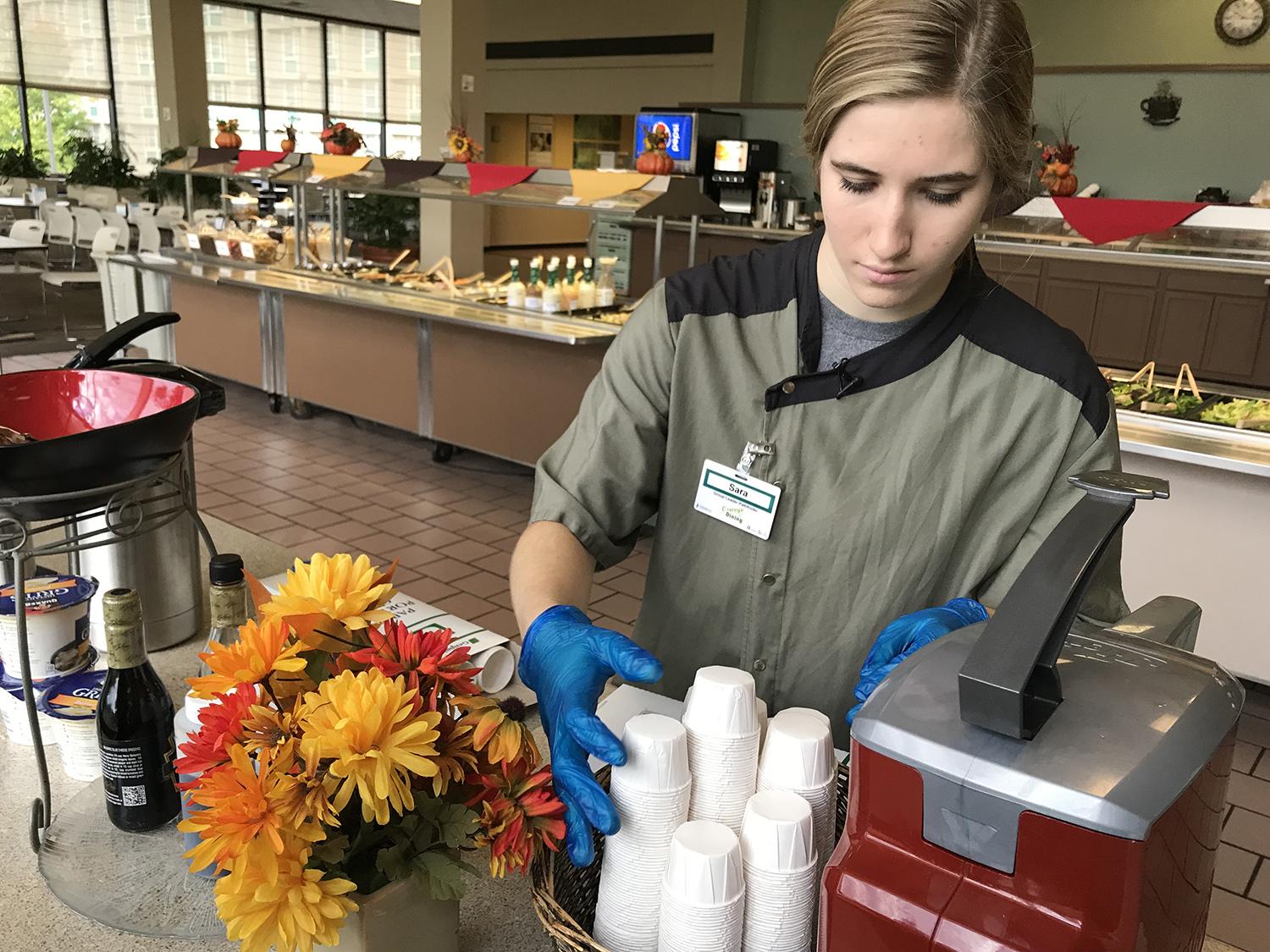Sustainability gains -- A number of suggestions from the President’s Group on Sustainability in Dining Centers at SUNY Oswego are leading to a reduction of plastic and increase in education where students and others eat. Sara Meal, a senior health promotion and wellness major, refills paper condiment cups -- which replaced their plastic counterparts over the summer -- in Pathfinder Dining Hall recently.
The use of plastics in SUNY Oswego dining centers is down, and sustainability education is up, thanks to a student question during one of President Deborah F. Stanley’s town hall meetings.
Eusebio Omar van Reenen -- then Student Association’s director of diversity and inclusion and now the SA president -- asked last fall about reducing plastics in the dining halls, and President Stanley decided on the spot to form a group to study and make recommendations.
“Sustainability and shared solution-seeking are two of our hallmarks as an institution,” President Stanley said. “Our students spoke and we listened. We immediately formed a campus committee representing the student body, faculty and staff.”
Some of the recommendations of the President’s Group on Sustainability in Dining Centers are easily evident, such as paper condiment cups, wooden stir sticks and no plastic straws. The big picture is that the college’s dining locations have eliminated the use of polystyrene plastic materials (which are rarely recycled), as the group’s current -- and future -- recommendations go into practice, while also letting consumers know why the changes are important.
Stanley appointed her executive assistant, Howard Gordon, and Michael Flaherty, general manager of Auxiliary Services -- which runs the college’s dining operation -- as co-chairs.
Junior biology major Linden Merrill was at the town hall meeting and quickly volunteered to be part of the group. “I wanted to get involved because it’s something I had seen for a while and I wasn’t sure how to get involved,” Merrill said.
Mary DePentu of Facilities Services and Timothy Braun, of the Research Foundation (who has taught courses in sustainability) brought their insights to round out the original team.
When Gordon retired after more than 40 years of serving his alma mater, Deputy to the President Pam Caraccioli stepped into his role on the group and was immediately impressed by their hard work and thoughtfulness.
“We all appreciate the students’ interest in sustainability,” Caraccioli said. “As a college, we have strived to become leaders in environmentally friendly practice, so seeing the students so engaged in both planning and solutions is very gratifying.”
President Stanley signed the American College and University Presidents' Climate Commitment in 2007, and the college’s many initiatives since have involved all new construction and renovations meeting Leadership in Energy and Environmental Design “green building” standards, establishing “Clean Water for All” as its first-ever campus-wide Grand Challenges project and a myriad of large and small projects and educational campaigns. So delving back into what happens where students eat dovetailed with this vision.
Making changes
The group went to the dining halls and “took a lap,” Merrill said, “and took notes on what caught our eyes, especially things like plastics.”
Many of the changes took place over the summer -- which, given the scale of dining operations, especially during the academic year, was the best time to overhaul Auxiliary Services’ inventory and practices.
“We serve 1.5 million meals a year in the dining halls, and another half million in our retail dining,” Flaherty said. “I’m fortunate to work with an amazing and conscientious team in Dining Services who were ready, willing and able to put their work into sustainable solutions wherever they could."
In addition to the replacing plastic materials that don’t break down in landfills, Auxiliary Services took into account individual use cases. Eating in Cooper Dining Hall’s ice cream center? Instead of a disposable plastic bowl, the customer now gets a reusable ceramic bowl and a metal spoon. Looking for a to-go meal from a retail dining center? The food containers are now recyclable, and takeout bags are now paper instead of plastic.
“A lot has changed,” Merrill noted. “I didn’t expect it to go so quickly, but Mike Flaherty and his team got on it.”
Point-of-purchase education is part of the effort as well, such as letting consumers know they can get a discount with reusable hot beverage mugs and indicating what beverage containers can be recycled.
Caraccioli said the Sustainability Office is working on corresponding campaigns with displays and digital signage to underscore how and why consumers can make environmentally friendly choices.
The group continues to look into ideas involving diverting the food waste stream -- in other words, figuring out what to do with food not consumed at the end of a shift at the dining centers. The college already donates prepackaged leftover food from its retail dining operations to the Salvation Army, which in 2017 included more than 4,500 grab-and-go items and nearly 18,000 bakery items. Auxiliary Services also donates bulk food items left over from residential dining centers at the end of the spring and fall semesters.
van Reenen is pleased the recommendations are an example of “students using their voice to fight for what is right, and fighting for the environment is always worth doing,” he said.
“Now our campus can become a leader in sustainable practices and can serve as a model for what others can do,” van Reenan added.
Ultimately it’s not just about changing what’s happening in the dining centers, Merrill said, but about impacting what consumers do wherever they go.
“Education is a really big part of it,” Merrill said. “I hope everybody becomes environmentally aware, even in a small-scale way, because this is really important.”




